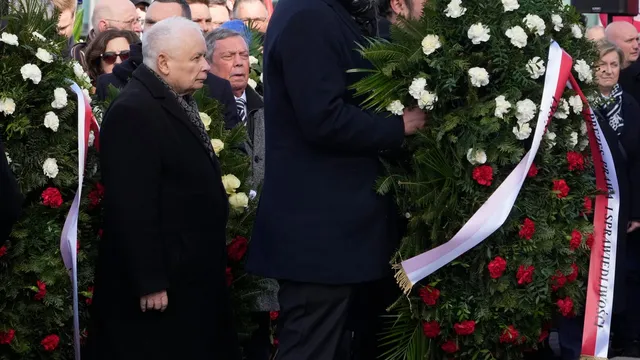
Russians disrupt Poland's commemoration of president's tragic plane crash
2025-04-10 11:27- On April 10, 2025, Poland's ambassador to Russia faced interruptions from protesters during a memorial for the 15th anniversary of the plane crash that killed President Lech Kaczyński.
- Protesters displayed anti-Polish sentiment, questioning the country's stance on the war in Ukraine and accusing Poland of terrorism.
- The ongoing divide between Poland and Russia remains evident, underscoring historical tensions that stem from the crash and political discourse regarding it.
Express your sentiment!
Insights
On April 10, 2025, Poland's ambassador to Russia, Krzysztof Krajewski, participated in a small commemoration ceremony in Smolensk, Russia, marking the 15th anniversary of the tragic plane crash that claimed the life of Polish President Lech Kaczyński and 95 others. The aircraft went down on April 10, 2010, while carrying a delegation to pay tribute to Polish officers killed in the Katyn massacre during World War II. Protesters emerged during the event, brandishing banners and shouting anti-Polish slogans, seeking to undermine the commemorative activities. Krajewski reported that the protesters questioned multiple matters, including the ongoing war in Ukraine, and made allegations that Poland supports terrorism and distorts history. In Poland, significant memorial observances were held in remembrance of the victims of the crash, recognized as a national tragedy that intensified distrust between Poland and Russia. Jarosław Kaczyński, the twin brother of the deceased president and leader of the Polish opposition party, attended the memorial events in Warsaw, illustrating the ongoing political relevance of the tragedy in Polish society. The crash not only left a deep impact on the families involved but also solidified historical tensions and divisions within the country toward Russia. The initial responses among Polish authorities were mixed, with gestures from Russian President Vladimir Putin suggesting a potential thaw in relations. However, subsequent actions, such as the refusal to return the wreckage of the plane to Poland, heightened suspicions of Russian intentions and contributed to rising concerns about aggression in the region. Over the years, investigations into the crash have produced conclusions centered around pilot error and heavy fog, yet the narrative is clouded by political insinuations. Jarosław Kaczyński has, without substantive evidence, suggested that political adversaries, including Prime Minister Donald Tusk, participated in foul play to eliminate his brother's influence. This unfounded speculation continues to be a source of contention within Polish politics. Tusk called for reconciliation, emphasizing the need for unity among Poles in honoring their shared history and moving toward a more respectful future.
Contexts
Polish-Russian relations since 2010 have been marked by significant tensions, complex historical legacies, and geopolitical considerations that have shaped interactions between the two nations. The aftermath of the 2010 Smolensk air disaster, which resulted in the tragic death of Polish President Lech Kaczynski and other high-ranking officials, profoundly impacted bilateral relations. The event led to a period of heightened emotions and national reflections in Poland, creating an environment of distrust towards Russia, which many Poles viewed as not fully transparent about the circumstances of the crash. This foundational event has continued to resonate in Polish political discourse, reinforcing a narrative of caution and suspicion regarding Russian intentions in Eastern Europe. In the subsequent years, Poland's alignment with NATO and the European Union has significantly influenced its stance towards Russia. Poland has actively advocated for a strong NATO presence in Eastern Europe, particularly in response to Russia's annexation of Crimea in 2014 and its involvement in the conflict in Eastern Ukraine. This has led to increased military cooperation and exercises among NATO allies, as Poland seeks to bolster its defense capabilities. Additionally, Poland's commitment to energy security has driven efforts to diversify its energy sources away from Russian dependency, exemplified by investments in liquefied natural gas (LNG) infrastructure and support for projects such as the Baltic Pipe, which aims to link Polish and Norwegian gas supplies. The lingering issues of historical grievances, particularly regarding World War II and communist rule, further complicate Polish-Russian relations. Polish society often views historical narratives through a lens of victimization and trauma, which affects contemporary political relations. Russia's attempts to frame historical events, such as the Molotov-Ribbentrop Pact and the Soviet invasion of Poland, can be met with significant backlash and anger from Polish officials and the public. Efforts to address historical grievances have occasionally sparked diplomatic tensions, with Poland responding firmly against perceived Russian historical revisionism. Looking ahead, the trajectory of Polish-Russian relations will likely continue to be influenced by broader geopolitical dynamics, regional security concerns, and internal politics within both countries. Poland’s firm alignment with the West, coupled with its strategic partnerships within NATO, suggests that relations may remain strained in the foreseeable future. Conversely, any potential shifts in Russian foreign policy or changes in the political landscape within Poland, including the approach of future administrations, might provide opportunities for dialogue and gradual improvement. Nevertheless, the weight of history and the ongoing conflict in Ukraine will likely pose significant challenges to any genuine rapprochement.